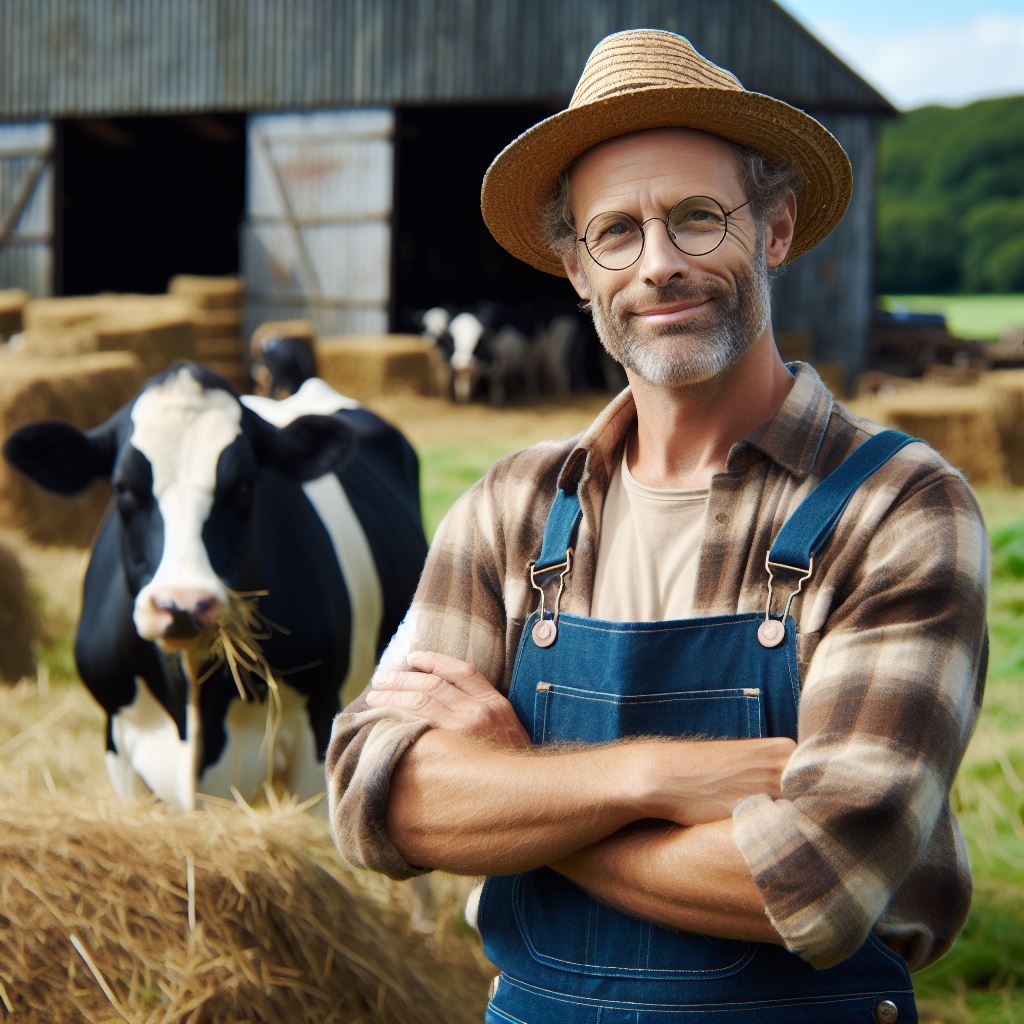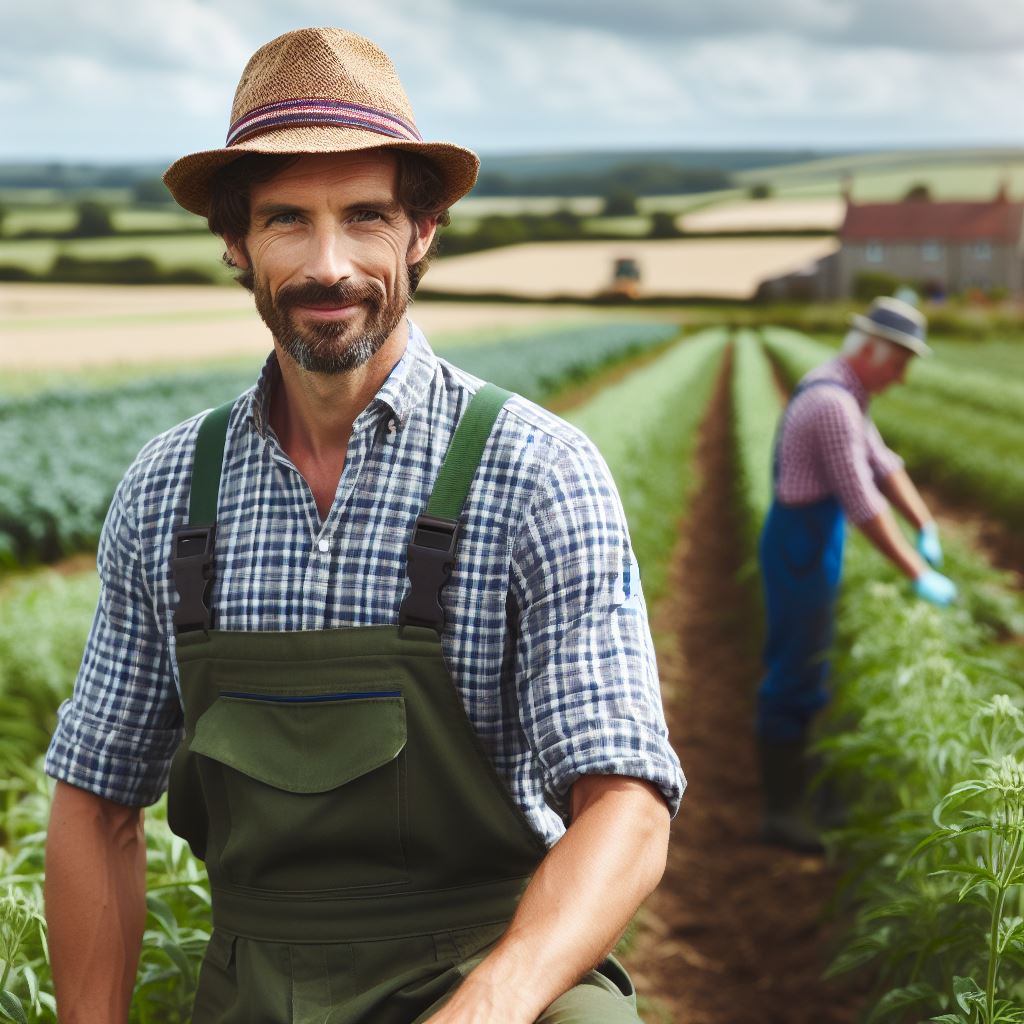Introduction
Young farmers in the UK play a vital role in the agricultural sector. This sector holds immense importance for the country’s economy and food security.
However, there is a growing need for a new generation of farmers to sustain this industry.
The agricultural sector in the UK is not only crucial for providing food but also for contributing significantly to the economy.
It generates billions of pounds and employs a large number of people. Young farmers are essential to continue this growth and meet the increasing demand for food in the future.
The need for a new generation of farmers arises from various factors. The average age of farmers in the UK is steadily increasing, and many are nearing retirement.
It is essential to replenish the workforce to prevent a decline in agricultural productivity and ensure a smooth transition.
Moreover, advancements in technology and changing consumer demands require a fresh perspective in farming practices.
Young farmers, with their innovative ideas and willingness to adapt, can bring in modern techniques and sustainable methods to enhance productivity while minimizing environmental impact.
Additionally, the agricultural sector faces challenges such as climate change, Brexit, and globalization.
These issues require young farmers to be equipped with the necessary skills and knowledge to navigate through uncertainties and steer the industry towards growth and resilience.
In fact, the future of UK agriculture greatly depends on the new generation of farmers. Their contribution is vital to sustain the economic and food security aspects of the agricultural sector.
By recognizing the importance of young farmers and supporting their entry into the industry, we can ensure the long-term viability and success of UK agriculture.
Challenges Faced by Young Farmers
Lack of Access to Land and High Property Prices
Young farmers in the UK face significant challenges when it comes to accessing land for farming.
The high property prices make it difficult for them to afford agricultural land, which limits their opportunities to start or expand their farms.
Without sufficient land, young farmers struggle to establish themselves in the industry and pursue their passion for farming.
Financial Challenges, Including Limited Access to Funds and Loans
Securing financial resources is another major obstacle for young farmers.
Limited access to funds and loans makes it challenging for them to invest in equipment, infrastructure, and other necessities for their agricultural operations.
Young farmers often struggle to find the necessary capital to start or sustain their farming ventures, hindering their growth and potential success.
Changing Consumer Demands and the Need to Adapt to New Technologies
Young farmers must navigate the ever-changing landscape of consumer demands and adapt to new technologies in order to remain competitive.
Consumer preferences and trends can fluctuate rapidly, requiring farmers to constantly adjust their practices and diversify their offerings.
Staying up-to-date with technological advancements is crucial for improving productivity and efficiency on the farm.
The Impact of Climate Change and Sustainability Issues
Climate change poses a significant challenge to young farmers and the future of agriculture.
Erratic weather patterns, extreme temperatures, and increased environmental concerns create additional obstacles for farmers.
Adapting to these changes and implementing sustainable practices can be costly and demanding, putting young farmers at a disadvantage without the necessary resources and expertise.
Young farmers in the UK face several challenges that hinder their ability to thrive in the industry.
The lack of access to land, high property prices, and limited financial resources significantly limit their opportunities.
Changing consumer demands, technological advancements, and the impact of climate change add further complexity to their endeavors.
Addressing these challenges requires the support of government policies, financial institutions, and the agricultural community as a whole.
By creating more affordable land options, improving access to funds and loans, fostering innovation, and promoting sustainable practices, the UK can pave the way for the success of its young farmers.
Read: UK Aquaculture Technician: Career FAQs
Support mechanisms for young farmers
There are several support mechanisms available for young farmers in the UK, aimed at helping them navigate the challenges and opportunities in the agricultural industry. These mechanisms include:
Government initiatives and support programs
- The UK government recognizes the importance of young farmers and has implemented various initiatives and support programs to assist them.
- These programs include financial assistance, grants, and subsidies specifically designed to help young farmers establish and grow their businesses.
- Government schemes provide funding for innovation, technology adoption, and sustainability practices.
- They also offer advice and guidance on regulatory compliance and accessing markets.
- Government-backed loan schemes, such as the Young Farmers’ Loan Scheme, enable young farmers to overcome financial barriers and access affordable credit.
- These government initiatives play a crucial role in empowering young farmers and ensuring their long-term success.
Agricultural colleges and vocational training opportunities
- Agricultural colleges and vocational training institutions offer specialized education and training programs for aspiring young farmers.
- These institutions provide hands-on learning experiences, teaching essential skills and knowledge necessary for a successful farming career.
- Students gain practical experience in areas such as crop management, animal husbandry, farm business management, and food production.
- These educational opportunities equip young farmers with the necessary skills, technical expertise, and industry insights to flourish in their chosen profession.
Mentorship and networking opportunities within the farming community
- Mentorship programs connect young farmers with experienced industry professionals who can provide guidance, support, and advice.
- Mentors offer insights into best practices, share their experiences, and help young farmers overcome challenges.
- Networking events and organizations allow young farmers to connect with peers, exchange ideas, and build relationships within the farming community.
- These opportunities facilitate knowledge-sharing, collaboration, and the cultivation of a supportive network.
Collaborative efforts with local businesses and organizations
- Collaborations with local businesses and organizations provide young farmers with essential resources and support.
- Partnerships with local suppliers can assist in sourcing quality inputs, equipment, and machinery at competitive prices.
- Cooperative organizations, such as farming cooperatives, enable young farmers to benefit from collective marketing, purchasing, and knowledge-sharing.
- Support from agricultural organizations, such as farming unions and associations, provides young farmers with representation and advocacy.
- These collaborative efforts contribute to the growth and sustainability of young farmers’ businesses.
In essence, young farmers in the UK have access to various support mechanisms that enable them to overcome challenges and seize opportunities in the agricultural industry.
Government initiatives, agricultural colleges, mentorship programs, and collaborations with local businesses all play a crucial role in nurturing the next generation of successful farmers.
Read: Sustainable Practices in UK Aquaculture Tech
Personalized UK Career Consulting
Receive tailored career guidance designed just for you. Get actionable steps and expert support to boost your career in 1-3 days. Take control of your career now.
Get Started
Success Stories of Young Farmers
Successful young farmers and their achievements
- Sarah Adams, a 25-year-old farmer from Yorkshire, started her own organic vegetable farm and has won multiple awards for her sustainable farming practices.
- John Cooper, a 28-year-old farmer from Wales, transformed his family’s struggling dairy farm into a successful agritourism destination, attracting visitors from all over the country.
- Emily Turner, a 30-year-old farmer from Scotland, established a cooperative with other young farmers in her region, creating a direct-to-consumer model that has increased their revenue significantly.
- Tom Wilson, a 26-year-old farmer from Oxfordshire, specializes in rare breed livestock and has successfully revived several nearly extinct species through his breeding programs.
- Lucy Bennett, a 27-year-old farmer from Cornwall, pioneered hydroponic farming techniques in her community, providing fresh produce year-round and reducing traditional farming’s water usage.
Innovative farming practices and diversification strategies
- Vertical farming, a method where crops are grown in stacked layers, is gaining popularity among young farmers due to its space-saving capabilities and higher yields.
- Many young farmers are using precision agriculture techniques, such as GPS and drone technology, to optimize their crop production and minimize environmental impact.
- Diversification strategies, such as adding agritourism, farm-to-table restaurants, or artisanal food production, are helping young farmers generate additional income streams.
- Young farmers are embracing agroforestry, a practice that integrates trees into farming systems, providing multiple benefits like increased biodiversity and improved soil health.
- Aquaculture is also gaining traction among young farmers, who are exploring fish farming as a sustainable alternative to traditional livestock practices.
The economic and social impact young farmers have had in their communities
- Young farmers have rejuvenated rural economies by creating job opportunities and attracting tourism through their innovative farming practices.
- Community-supported agriculture (CSA) models, initiated by young farmers, have strengthened local food networks and provided access to fresh, locally grown produce.
- Young farmers actively participate in farmers markets, educating consumers about sustainable farming and promoting healthier eating habits.
- By investing in renewable energy sources, young farmers have reduced their carbon footprint and contributed to the fight against climate change.
- Through social media and online platforms, young farmers have influenced a new generation of consumers who value sustainable and locally sourced food.
In short, young farmers in the UK are making significant strides in the agricultural sector through their innovative practices, diversification strategies, and dedication to sustainability.
Their success stories not only inspire fellow farmers but also promote economic growth and positive social change in their communities.
Read: Aquaculture in the UK: Education Pathways
Role of Young Farmers in Shaping the Future of Agriculture
Importance of Young Farmers in Addressing Food Security and Sustainability
- Young farmers play a crucial role in ensuring food security for the growing global population.
- They embrace sustainable farming practices, minimizing environmental impact, and preserving natural resources.
- Their innovative approaches contribute to increasing agricultural productivity and efficiency.
- By adopting responsible land management techniques, they protect ecosystems and biodiversity.
Potential for Technological Advancements and Modern Farming Techniques
- Young farmers are early adopters of technology, harnessing its potential to revolutionize the agricultural sector.
- They utilize precision farming tools, including drones and sensors, to monitor and manage crops effectively.
- By leveraging data analytics and artificial intelligence, they optimize irrigation, fertilization, and pest control.
- Modern farming techniques implemented by young farmers lead to improved yields and reduced wastage.
Role of Young Farmers in Promoting Local and Organic Produce
- Young farmers prioritize sustainable, local, and organic farming practices, responding to consumer demand.
- They establish direct relationships with consumers through farmers’ markets, CSAs, and online platforms.
- By offering fresh and nutritious produce, young farmers support healthier lifestyles and dietary choices.
- Their focus on local farming helps reduce carbon emissions associated with long-distance transportation.
Encouraging More Young People to Consider a Career in Farming
- Educating young people about the diverse career opportunities in the agriculture sector is crucial.
- Young farmers can act as ambassadors, sharing their experiences and showcasing the rewards of farming.
- Promoting entrepreneurship and innovation within the farming community attracts young talents.
- Providing financial incentives, training programs, and access to land can entice more youth into farming.
In fact, young farmers play a significant role in shaping the future of agriculture. They contribute to food security, sustainability, and technological advancements.
By promoting local and organic produce, they meet consumer demands for healthier and environmentally-friendly options.
It is essential to encourage more young people to consider a career in farming, ensuring a vibrant and prosperous agricultural industry for generations to come.
Read: Aquaculture Law: UK Regulations Explained
Explore Further: Fishermen’s Training: How to Start in the UK
Conclusion
Young farmers in the UK face numerous challenges such as limited access to land, financial constraints, and a lack of experience.
However, they are supported by various mechanisms such as government programs, mentorship opportunities, and agricultural education.
Despite these challenges, there have been several success stories of young farmers who have overcome the odds and established thriving agricultural businesses.
These success stories serve as inspiration and proof that with determination and support, young farmers can contribute significantly to the future of agriculture in the UK.
The new generation of farmers is crucial in shaping the future of agriculture. They bring fresh perspectives, innovative ideas, and a willingness to adopt sustainable practices.
Their involvement is necessary to tackle the pressing issues of food security, climate change, and the need for more sustainable farming methods.
It is important for readers to support and promote young farmers in their communities.
This can be done by buying locally produced food, attending farmers’ markets, or even investing in agricultural ventures.
By supporting young farmers, we not only ensure the future of agriculture but also contribute to the economic development and vitality of our communities.
So, let’s recognize the significance of young farmers and the integral role they play in shaping the future of agriculture.
Let’s support and promote their efforts, ensuring a robust and sustainable agricultural sector for generations to come.
[E-Book for Sale]
500 Cutting-Edge Tech Startup Ideas for 2024 & 2025: Innovate, Create, Dominate
$19.99 • 500 Tech Startup Ideas • 62 pages
You will get inspired with 500 innovative tech startup ideas for 2024 and 2025, complete with concise descriptions to help you kickstart your entrepreneurial journey in AI, Blockchain, IoT, Fintech, and AR/VR.




